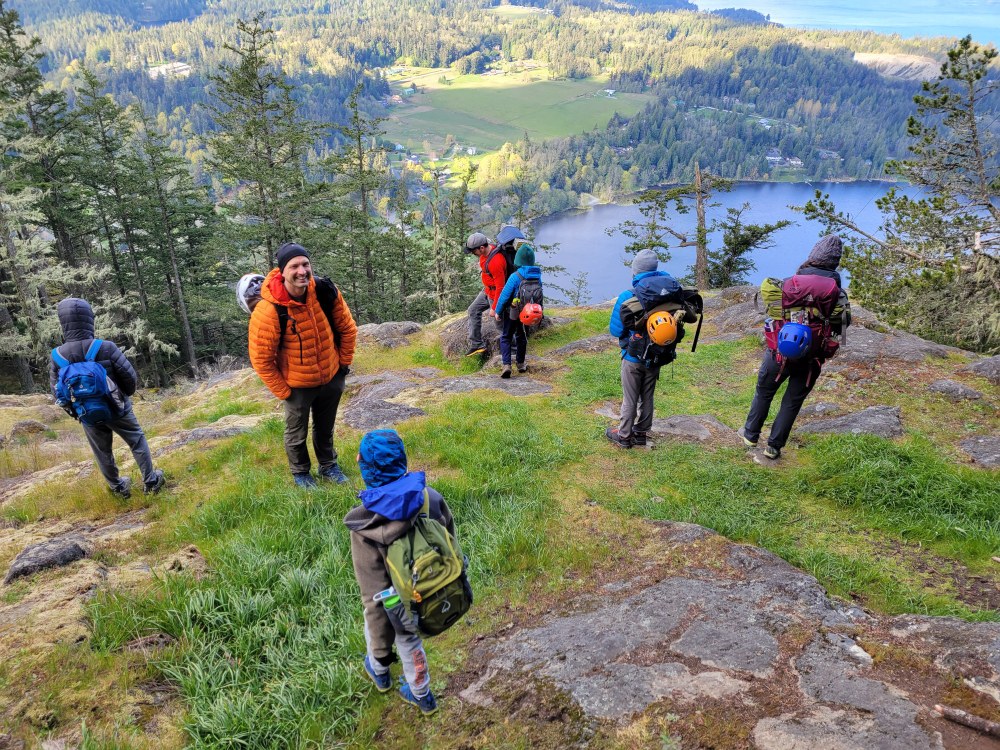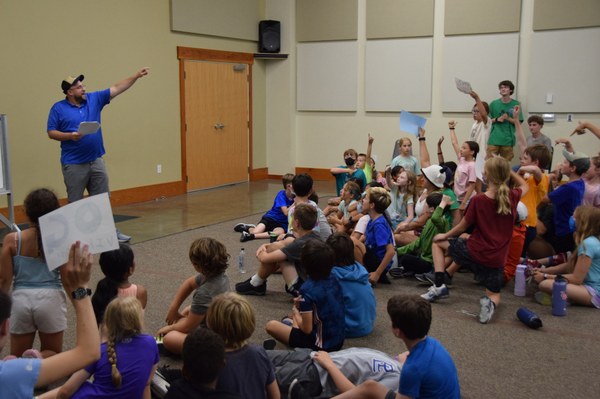
How many national parks are there in Washington? Why is Washington nicknamed the Evergreen State? When visiting wilderness, what should you take home with you?
If you knew that Washington has three national parks, about half of the state is covered in forests, and you should take home only photos when visiting wilderness, you’re just as conservation-savvy as Mountaineers summer campers, who nailed these questions during a rousing public lands trivia game last August. The excitement among the teams of nine to 12-year-old campers echoed across the Seattle Program Center as they eagerly answered trivia questions about public lands, conservation, wilderness, and fun outdoor facts about Washington.
Creating engaging learning opportunities such as public lands trivia is just one of the ways we’re working to educate youth on the importance of conservation. At The Mountaineers, we introduce young people to the benefits of outdoor recreation because we believe that an early connection to nature gained through outdoor experiences fosters a strong appreciation for the natural world and a commitment to conserving it. We help youth develop a healthy lifestyle and create experiences that improve their outdoor skills, perseverance, self-confidence, and self-reliance.
Our year-round clubs, camps, and other youth programs help young outdoor enthusiasts explore the public lands and waters of Washington State and beyond. Whether it’s climbing at Exit 38, snowshoeing at Lake Easton, or hiking the Hoh River Valley in the Olympics, our youth programs provide the special moments and memories that allow younger Mountaineers to build community and cultivate interest in a life outdoors. There’s no better time to encourage deep reflection about the natural places youth are experiencing and why it’s important to conserve them.
Talkin’ conservation with Mountaineers youth
While staff and volunteers have informally incorporated conservation education into youth programming over the years, we recently ramped up efforts to show our younger members that conservation knowledge is the 11th essential. Thanks to additional capacity on our conservation team, we began sharing conservation lessons with our Seattle youth clubs and summer camp in the fall of 2021.
These hands-on learning experiences focus on building an understanding of why conservation is important, clarifying the different types of public lands and their varying uses, and making connections with the places youth explore with The Mountaineers. Lessons are typically taught with fun group activities, including creating posters promoting youth members' favorite public lands and playing the "Name that Washington Volcano" game.
 Seattle summer campers partaking in a lively game of public lands trivia.
Seattle summer campers partaking in a lively game of public lands trivia.
Conservation is intertwined with every aspect of outdoor recreation. “It’s just as important to engage youth on conservation and advocacy topics as it is to teach them fundamental skills like Leave No Trace, first aid, and belaying," said former Seattle youth clubs staff member Carl Marrs.
By increasing awareness of public lands, and having some fun along the way, we’re building trail markers to help our younger Mountaineers find that sweet spot where recreation and conservation intersect. Doing this early in their outdoor journey gets them ready for a lifetime of adventure with purpose. “Learning about conservation and public lands is an important piece of The Mountaineers youth clubs experience,” shared Seattle Mountaineers Adventure Club (MAC) member Malcolm Bryan. “It helps create good stewards of the land and teaches participants important lessons.”
Public lands are Native lands
Part of building a strong conservation ethic is understanding that the public lands where we hike, ski, and climb are also Native lands. During the 2022-23 programming year, we began incorporating lessons about Native peoples of Washington and their ancestral lands into our educational curriculum for Mountaineers youth.
At the November 2022 Seattle Mountaineers Adventure Club meeting, Conservation & Advocacy Director Betsy Robblee led a discussion about the importance of honoring the cultural history of the lands and waters where we recreate. Club members learned about the importance of recreating mindfully and respectfully, and avoiding a culture of conquest over nature — perpetuated through terms such as “first ascents” and “peak bagging” — through educational resources created by tribal governments and Native organizations, including the Snoqualmie Tribe’s Ancestral Lands Movement.
One of the ways The Mountaineers is seeking to grow our community’s awareness of Native peoples and their connection to our region’s lands and waters is through the practice of land acknowledgment. Land acknowledgments are brief statements that recognize and respect Indigenous peoples’ historical and ongoing stewardship of, and connection to, the land. Practicing land acknowledgment is particularly important for The Mountaineers because our trips and activities take place on the ancestral or traditional lands of Native peoples.
 Seattle Mountaineers Adventure Club members drafting land acknowledgment statements at a club meeting.
Seattle Mountaineers Adventure Club members drafting land acknowledgment statements at a club meeting.
Using The Mountaineers organizational land acknowledgment statement as a starting point, MAC members collaborated on how to integrate land acknowledgments into their shared outdoor experiences and brainstormed what a specific statement might look like for our youth clubs. “That lesson was a great reminder that we’re all living in places where Native people lived and are still living today,” said MAC member, Beckett Efta. Following the meeting, MAC began incorporating the following land acknowledgment statement into their club’s trip planning process:
The Mountaineers Adventure Club acknowledges that we recreate on the ancestral lands of the Indigenous peoples of the Pacific Northwest. As we use this land, we wish to be respectful of both the land and its original stewards.
“It’s important to make these conversations part of the consciousness of Mountaineers programs in general, and especially with MAC,” said Seattle MAC parent, Ken Efta. Educating youth about Native lands and land acknowledgment early on sets them up for a lifetime of culturally cognizant and mindful recreation.
By incorporating the practice of land acknowledgment into our programs, we are building a framework for a more meaningful relationship between recreationists and our beloved landscapes. We’re encouraging our community to consider the connections that Indigenous peoples hold to the places we explore together, and inspiring our membership to do more to conserve and steward the Northwest’s lands and waters.
Making conservation connections
Our recent efforts to integrate conservation education into the organization’s Seattle-based youth programs have left many young Mountaineers and their parents interested in public lands and inspired to learn more about the natural world, especially the places where they recreate.
We all have a responsibility to grow our own understanding of conservation and responsible recreation, and encourage others to do the same. So, the next time you’re enjoying the outdoors, consider how the land you’re recreating on has been stewarded by Native peoples since time immemorial. The next time you’re adventuring with a younger outdoor enthusiast, take a moment to ask them a question that could spark a deeper connection and a lifelong interest in the outdoors. Together, we can cultivate future generations of champions for the natural world and the recreation experience.
Learn more & get involved
As we continue to grow our conservation education efforts and reach youth in our Tacoma and Olympia programs, we’re looking for qualified youth leaders to support this work. Those interested in learning more are encouraged to contact conservation@mountaineers.org.
More information on land acknowledgment can be found on our land acknowledgement webpage.
Resources from the Snoqualmie Tribe’s Ancestral Lands Movement can be found at snoqualmietribe.us/snoqualmie-tribe-ancestral-lands-movement.
This article originally appeared in our summer 2023 issue of Mountaineer magazine. To view the original article in magazine form and read more stories from our publication, visit our magazine archive.
 Conor Marshall
Conor Marshall